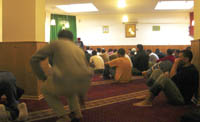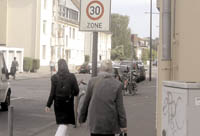
Muslims in Germany:Obstacles prevent integration [Archives:2007/1052/Reportage]
May 21 2007
 |
 |
[email protected]
In the past few years, European countries have stepped up efforts to more fully integrate their expanding Muslim populations. Germany is one European nation where Muslim integration has become a crucial demand, particularly with the government's initiative of granting foreigners extensive social and civil rights.
In an effort to highlight Germany's Islamic community, the German Foreign Ministry, in association with the Goethe Institute, organized a field visit to Germany for Arab journalists to meet Muslims, German officials and religious figures. This reporter was among them and returned with a different outlook on the obstacles facing Germany's Muslims.
Some 450,000 of the 3.5 million Muslims living in Germany, two-thirds of which are Turkish, have German citizenship. However, this community, which comprises 3 percent of Germany's population, is struggling to integrate into German society.
The German government recently adopted dialogue with Islamic organizations in Germany; however, such dialogue has raised a debate about the Muslim community's readiness to follow the values of a secular society, while at the same time questioning German society's willingness to truly and comprehensively recognize Islam.
Dr. Johannes Urban, an official at Germany's Federal Ministry of the Interior, stressed the German government's will for Muslim integration into German society, but he sees some obstacles retarding such integration.
For example, the rate of Muslim women attending school is less than non-Muslim women. Also, most young Muslims don't speak German, which means they can't find a job easily. Urban also referred to discussions about the choice of most Muslim parents to prevent their daughters from participating in swimming classes, sex education classes and camping trips.
However, he emphasized the importance of solving such problems by opening dialogue with the Islamic community and viewing a May 2 conference on Islam in Berlin as a good chance for Islamic organizations and the German government to meet and exchange views.
Unlike Urban, the German media and some Muslim residents in Germany criticized the conference, alleging that the Islamic association and organizations participating in the conference didn't represent all Muslims in German society and therefore, didn't achieve the conference's common goal of establishing a centralized Islamic organization to dialogue with the German federal government on matters concerning Islam, including the Muslim community's religious, social and political interests.
Historical and societal factors
“It's not only Muslim attitudes and practices that make their integration into German society difficult,” says Lina Ganamah of the Arab Women's Forum in Berlin, explaining that historical and social reasons also contribute to Muslims' isolation.
In the 1960s, Germany opened its doors to immigrants to address an acute labor shortage during a period of rapid economic development by inviting “guest workers” from less developed countries to do jobs for which Germans were unavailable. Under agreements with foreign governments, these workers were expected to stay for a fixed term and leave when their services no longer were needed.
Many of the original guest workers (Italians, Greeks and other southern Europeans) did return to their native countries; however, subsequent groups of guest workers, mostly Muslim Yugoslavs, Turks and North Africans, stayed and eventually brought their families to join them.
However, they and their children remained largely segregated from German society, living in their own communities and sometimes having little contact with their host society. “Now, there's the fourth generation of these immigrants, but most of them don't speak German and most are jobless,” Ganamah noted.
Regarding the German education system, she says the Muslim community has difficulty adapting to such a system and compared to their non-Muslim classmates, Muslim students' marks aren't good. “In fact, most Muslim parents don't push their children to acquire further education or knowledge because they themselves lack education,” Ganamah says.
She points out that many parents want to instill their Islamic and cultural values in their children, but think certain classes, such as sex education or sports classes for girls, may impact their children's attitudes toward those values.
“After Sept. 11, many things changed. Islam and Muslims came under focus as the German government wanted to know more about the community. Germans are only just beginning to realize that many of the Muslims who came here as 'temporary' guest workers have put down roots and are here to stay. For too long, Germany denied that it was an immigration destination with no proper integration programs in place,” Ganamah added.
Islamic religious education
While Germany's Constitution stipulates that religious education must be standard in public schools, the rule thus far has been applied regarding only the Catholic and Protestant majorities. Recent support for Islamic education announced by both Christian Democrats and Liberal Social Democrats has marked a decisive shift; however, Islam still isn't being provided as a standard part of the German curriculum. Nevertheless, education experts stress the importance of the subject in shaping Muslims' identity as well as intercultural dialogue.
Islamic Academy manager Hayrettin Aydin highlighted this point when mentioning the German government's discussion in the past five years about the ability to provide Islamic education in the German language to approximately 350,000 Muslim students in its public schools.
Introducing Islamic education under state supervision already has confronted a particularly difficult obstacle, according to Aydin, who says the main problem is identifying an educational authority that can fairly represent the many expressions of Islam.
To offer the subject in the same way as is done for Catholics and Protestants, government authorities need an Islamic religious community to serve as a representative organization. However, unlike Christian churches, which have fairly well defined membership structures, no one entity can claim to represent the majority of Germany's Muslims.
Negative images promote fear
Last year, on July 31, German surveillance cameras in a Cologne train station filmed several suspects as they wheeled suitcases into the station. The suspects, who were from Lebanon, were arrested on charges of planting crude bombs on two trains at the station.
The bombs, found later that day on trains at Koblenz and Dortmund stations, failed to explode due to faulty detonators. This incident and others that have occurred in European countries, such as in London in 2005, has created a social fear among Germans, who link such terrorist acts with Muslim residents in their country.
“Our problem isn't with the German Constitution; on the contrary, the constitution insures religious freedom. Rather, our problem is the societal fear of Muslims, but such fear can be dispelled by dialogue,” proposes Abdulqader Azrak, a member of the Islamic Central Committee in Germany .
He stresses the role of Islamic establishments in Germany, saying, “We think Islamic associations and mosques should try to explain that immigrants in any country must respect that country's laws.”
However, such fears won't be dismissed easily, particularly given the negative image of Muslims in the media, Aydin says, noting that the German media essentially focuses on negative news from the Muslim world and ignores the positive aspects.
These images impact Muslims' integration in Germany, as they repeatedly must declare their commitment to the German Constitution, non-violence and the equality of men and women. Such pressure to justify their actions shows that Muslims still are considered backward and a threat to Western social order.
Tuncay Ozdamar of Westdeutshen Radio admits that German media aren't objective in reporting Islamic world news, focusing only on negative aspects, which leads the public to form wrong and negative views of Muslims.
He further notes that German media have failed to attract immigrants' attention, especially Turks who still watch Turkish channels, which affects their ability to learn the German language.
Where are the mosques?
Nezar Ahmed, a second generation Muslim in Germany, mentioned his frustration at not being able to pray in a “real” mosque. According to him, most Muslims in Germany pray in mosques hidden from view in old factory buildings and basements. “Most Germans wouldn't accept a more traditional looking mosque in their neighborhood,” he said, noting that building traditional mosques often is controversial.
Aydin agrees that there are controversies in some German states related to building mosques. “However, today, more and more mosques are being built in Germany in the classic Oriental style. In German cities like Cologne, a muezzin calls devout Muslims to prayer, at least in those neighborhoods where people aren't bothered by the loudspeaker.”
Hijab difficulties
Some German states like Baden-Wuerttemberg have given initial approval for a law to stop teachers from wearing the hijab or headscarf. The state's education ministry wants to ban any public display of religion or politics, which could endanger the neutrality of the state education system.
Civil rights organizations and groups representing Germany's Muslims have strongly criticized the proposed ban, arguing that the right to wear hijab is a question of religious freedom.
The proposal follows a controversial ruling last September by Germany's highest court, stating that it is entitled to ban teachers from wearing hijab.
Teacher Fereshte Ludin, who was denied a job in Baden-Wuerttemberg in 1998 because she wore a hijab at school, went to court arguing that the German Constitution guarantees her religious freedom. The Federal.Constitutional Court ruled that, under current law, she could wear the hijab, but it also said individual states could pass new laws banning the practice
Sabiha Al-Zayat, who works at the Islamic Women's Center for Research and Encouragement, commented, “In the past, maybe five years ago, wearing the hijab wasn't a big deal, but nowadays, wearing the hijab has become a serious issue discussed in Parliament.” She adds that nearly 30 Muslim teachers have left their jobs due to insisting upon wearing hijab.
The hijab controversy can create other problems delaying Muslims' integration. Sema Tozoglee, 24, immigrated with her Turkish parents to Germany when she was only a year old. She now lives in Bonne with her Muslim German husband.
“I'm doing my best to integrate into German society. I speak their language, I studied in their schools, I married a German guy I do whatever I can to increase my ability to be treated as a German citizen,” she explains, pointing out that despite these efforts, she still suffers as a Muslim in a secular community.
“When I was 18, I decided to wear the hijab, but I then noticed Germans looking at me for being different.” Her friend Huelya, also wearing hijab, stresses that their insistence upon wearing it is the reason for not being employed in many occupations, although they are qualified.
Religious dialogue
pastor Beate Schreiter admits that certain obstacles can prevent Muslims' integration into German society, but she believes such obstacles can be solved by dialogue and exchanging experiences. She adds that there are concerns among Germans regarding Islam, as well as Muslim concerns regarding how they can retain their identity in a secular community ike Germany.
“Our method of dialogue should change according to the reality in which we live today. In the past, we dealt with Muslims as temporary immigrants, but today, fourth and fifth generation Muslim immigrants live in Germany, so we should deal with them not as workers, but as citizens. According to a study, Muslims will comprise 20 percent of Germany's population by 2030, so such dialogue is very important,” Schreiter concluded.
——
[archive-e:1052-v:15-y:2007-d:2007-05-21-p:report]


